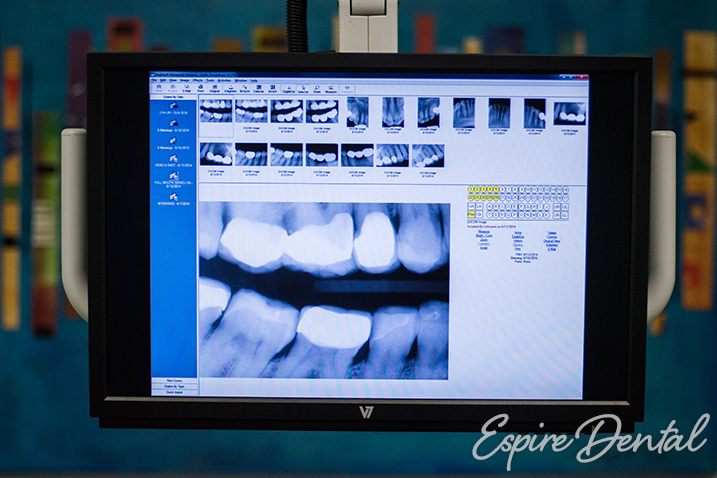
Getting a dental X-ray might seem intimidating for some. But there’s nothing scary about dental X-rays — especially with new digital X-ray options, which greatly reduce radiation exposure. A simple X-ray checkup can allow your dentist to detect damage that isn’t visible to the naked eye, which is why medical experts recommend regular dental X-rays for everyone.
What is a Dental X-Ray?
Dental X-rays can be a critical part of the dental diagnostic process. There are plenty of dental conditions that can’t be detected with a standard checkup — and certain patients, especially children, are more at risk for complications that are invisible during a normal checkup.
The idea behind dental X-rays is simple: to provide a holistic assessment of your dental health, your dentist needs to see what’s happening below the surface. While patients in the past may have been hesitant to get X-rays because of the risk of exposure to radiation, modern X-ray technology has advanced so that radiation exposure can be successfully mitigated.
Traditional X-rays reduce radiation to inconsequential amounts by using a lead apron and thyroid collar. Modern digital X-rays take radiation protection a step further, offering an 80 percent reduction on the level of radiation produced by traditional X-rays.
How Do Dental X-Rays Work?
A dental X-ray is usually conducted in one of two ways: a bitewing X-ray, or a more holistic panoramic X-ray. Bitewing X-rays are the most common in standard checkups, and they allow your dentist to examine the crowns and roots of your teeth to detect any damage. A panoramic X-ray encircles your whole head, and is usually used for more in-depth gum or jaw checkups. Both types of X-rays can be offered digitally depending on the practice you visit.
Getting regular dental X-rays can pay off in ways you can’t always predict. While malignant dental damage and tooth decay may not always be painful or visible, it’s important that your dentist catches any damage early on. Gum disease, wisdom teeth, and bone damage can be costly and dangerous if left untreated. Dental X-rays are an integral part of a dental checkup, and everyone should consider them more important than just a minor precaution. Regular X-rays are a painless investment that can prevent dental damage over the years.
But how often should you get a dental X-ray? The answer depends somewhat on your age and other risk factors for dental disease. Medical professionals recommend that most adults should get an X-ray once a year, but that recommendation is increased to twice yearly if you smoke or have another factor that puts you at a higher risk of damage. For example, children are more susceptible to intra-gum damage, since their teeth are still shifting and growing in. Because of this, many experts recommend that children get X-rays twice a year until a dentist determines they are at low risk for complications.
The Benefits of Digital X-Rays
As X-ray technology continues to improve, dentists are beginning to make the switch from traditional X-rays to digital X-rays. In addition to the safer levels of radiation emitted, digital X-rays also offer a whole host of benefits.
Digital X-rays are overall more efficient than traditional ones, since technicians can download a high-quality digital image instead of going through the time-intensive process of developing a print. This can save time and money for both the dentist and the patient. For curious parents, digital X-ray images can be transferred to other digital devices. And digital X-rays are more environmentally-friendly, too — they use less energy and fewer resources than the traditional model.
Preventing serious dental issues is in everyone’s best interest. If you’re looking for a dental practice that offers digital X-ray technology and expert care, we’ll be proud to take care of you at Espire Dental. The digital X-rays at Espire are a hassle-free and non-invasive way to keep your teeth healthy and your smile bright. Schedule an appointment today to experience a digital X-ray for yourself.

